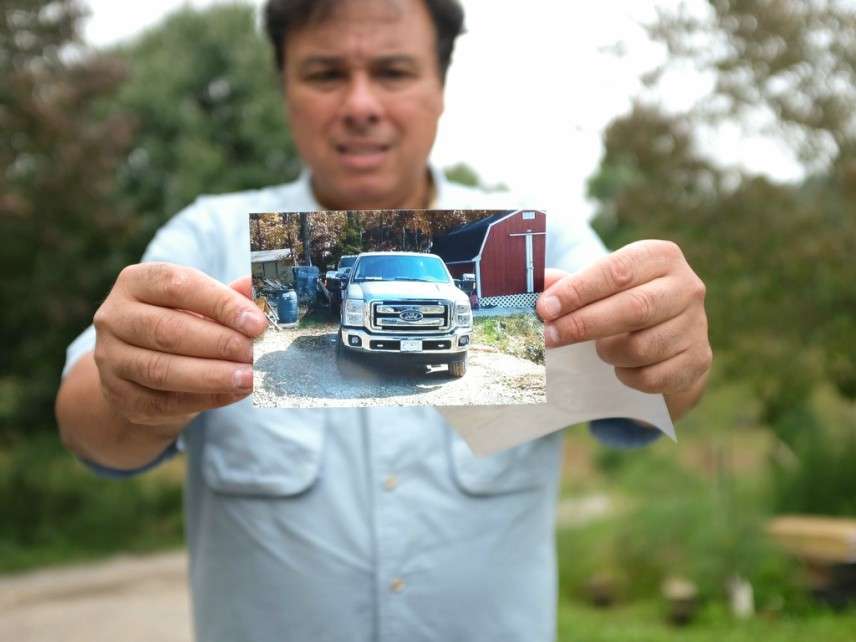2 Years After CBP Took His Truck Because of a Few Forgotten Bullets, Still No Hearing
A new lawsuit argues that owners of vehicles seized at the border have a constitutional right to prompt hearings.

Gerardo Serrano was on his way to visit his cousin in Mexico when Customs and Border Protection (CBP) agents at the border station in Eagle Pass, Texas, found a magazine containing five .380-caliber rounds in the center console of his pickup truck. Serrano, a U.S. citizen with a concealed-carry permit issued by Kentucky, said he did not realize the magazine was in the truck and offered to leave it behind as he continued on his journey. But as far as the CBP agents were concerned, those five cartridges made Serrano an international arms smuggler. Although he was never charged with a crime, the agents seized the truck, a 2014 Ford F-250. That was two years ago, and Serrano still has not been given a chance to challenge the still-pending civil forfeiture of his property.
In a federal lawsuit filed last week, the Institute for Justice argues that property owners like Serrano have a constitutional right to a prompt hearing after a seizure, a right that CBP systematically violates. "Federal statutes do not provide for a prompt post-seizure hearing when property is seized for civil forfeiture by CBP, and CBP regularly fails to provide any kind of prompt post-seizure hearing," the complaint says. "Plaintiff has filed this suit to recover his property and to put that policy or practice to an end." In addition to the return of Serrano's truck and compensation for the costs he has incurred as a result of the seizure, the suit asks the court to certify a plaintiff class of similarly situated vehicle owners and order CBP to start respecting their due process rights.
Serrano attracted CBP attention because he was creating a record of his trip to share with friends and relatives on social media and used his phone to take pictures of the border station. CBP prohibits unauthorized photography near ports of entry. (After the ACLU challenged that policy on First Amendment grounds in 2012, a federal judge in California ruled that the ban was justified by the agency's "interests in preserving the integrity of its sensitive border search techniques, law enforcement operations, and criminal investigations.") After seeing Serrano take pictures, a CBP agent pulled him out of his truck, handcuffed him, took his phone, and demanded the password, which he refused to give. When Serrano complained that his constitutional rights were being violated, the complaint says, the agent responded that he was "sick of hearing about your rights" and told Serrano "you have no rights here."
In this context, the seizure of Serrano's truck looks a lot like retaliation for his uppity attitude. Upon discovering the ammunition, according to the complaint, an agent exclaimed, "We got him!" The agent who had handcuffed Serrano told him, "You're in big trouble now." Serrano explained that he had a Kentucky carry permit, which was respected in the states he had traversed on his way to the border (Tennessee, Arkansas, and Texas). Hence his inadvertent transportation of the handgun magazine had not violated any laws yet. Since he was still in the United States, he wondered, couldn't he just leave the magazine at the border station? Sure, the agents said, but you'll have to leave your truck too.
Serrano opted not to pursue the administrative process for appealing a seizure, where the same agency that took the asset decides whether to keep it. Instead he paid a $3,805 bond (10 percent of the asset's value) so his case could be heard in federal court. But despite repeated inquiries, the case still has not been assigned to a federal prosecutor, let alone heard by a judge. According to the complaint, a CBP paralegal (one of the plaintiffs named in the suit) told Serrano "the attorneys who file forfeiture cases are very busy and cannot quickly process cases."
The U.S. Court of Appeals for the 5th Circuit, which includes Texas, ruled in 1983 that a 13-month delay between the seizure of money and the filing of a forfeiture complaint (which precedes a hearing) violated the right to due process. "The two-year delay in this case is far more extreme," notes Robert Everett Johnson, one of the I.J. attorneys representing Serrano.
In the Western District of Texas, I.J. says, the average time between a CBP vehicle seizure and the filing of a forfeiture complant is 150 days. Such a delay would be unacceptable in the 2nd Circuit, where a 2002 case involving the New York Police Department established that owners have a right to a hearing "promptly after their vehicles are seized." Johnson says I.J. wants the 5th Circuit to "adopt the Second Circuit's rule that you are entitled to a hearing within days of the seizure."


Show Comments (41)